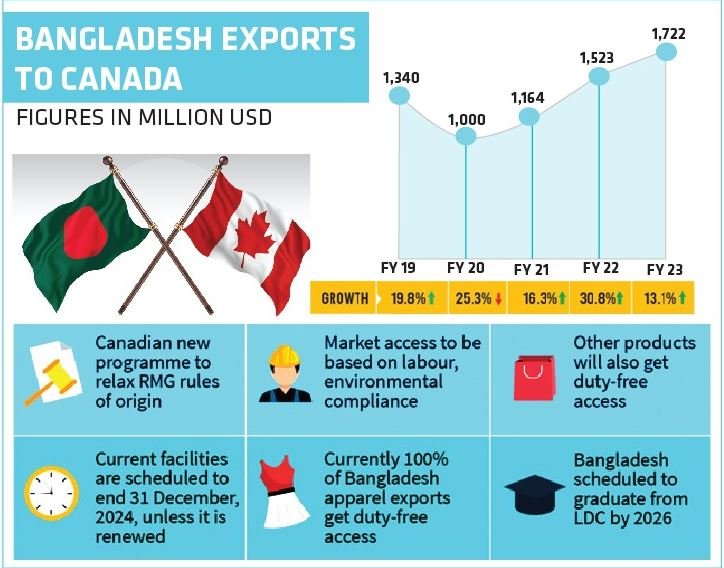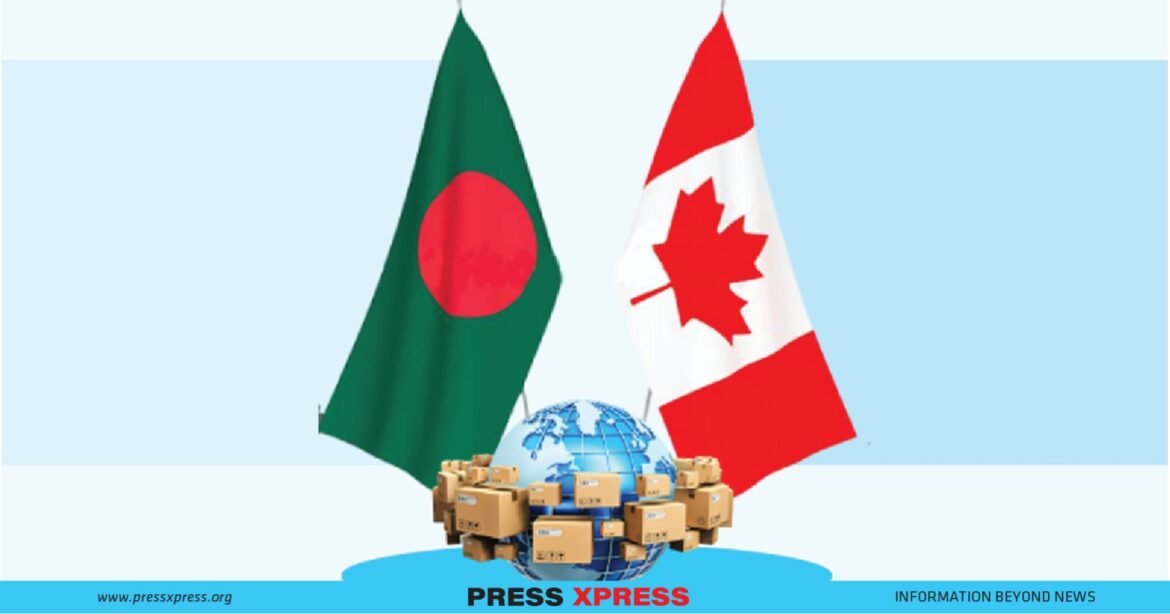The new programme also proposes to extend this market access benefit based on labour and environmental compliance of the industries.
Due to the passage of a bill in the Canadian parliament, Bangladesh’s duty-free entry into the Canadian market will remain in effect until 2034. According to Canada’s Department of Finance, the Canadian government has extended duty-free market benefits to all developing countries after transitioning from LDCs or Least Developed Countries status in 2026. Bangladesh will also benefit under this facility. Additionally, it offers tariff-free access for a diverse range of other commodities.
The new programme also suggests the expansion of this market access advantage, which would be contingent on industries’ adherence to labour and environmental standards.
You can also read: UK Grants Duty-Free Access to 92% of Bangladeshi Exports
BGMEA’s observation
The President of the Bangladesh Garment Manufacturers and Exporters Association (BGMEA), Faruque Hassan, has welcomed this decision by the Canadian government. He believes that it will support the transformation of the country’s industries towards a safer, cleaner, greener, and more sustainable workplace. Additionally, it will contribute to overall infrastructure development in Bangladesh. Hassan sees this as an opportunity to take bilateral trade between Bangladesh and Canada to new heights.
Faruque Hassan also highlighted BGMEA’s proactive efforts to navigate a seamless transition following the eventual graduation from LDC status, particularly in terms of trade relations with key partners. ‘We have received positive assurance from Australian Government officials regarding the continuity of duty-free market access post the LDC graduation,’ he mentioned.
Canada the 11th largest exporting partner of Bangladesh
As per data from the Export Promotion Bureau (EPB), Canada was the 11th largest exporting partner of Bangladesh with a $1.72 billion export in FY23. Notably, Canada stands as a prominent market for Bangladeshi apparel. The export of Bangladeshi readymade garments (RMG) to Canada escalated to $1.55 billion in FY23, marking a substantial 16.55% growth from the previous fiscal’s $1.33 billion.
Since 2003, Bangladeshi products have enjoyed unrestricted duty-free and quota-free access in Canada under the Least-Developed Country Tariff (LDCT) scheme, a component of the General Preferential Tariff (GPT) program. The country continues to receive General Preferential Tariff (GPT) benefits in the Canadian market, particularly in the realm of ready-made garments, with duty-free privileges extended until 2024. Notably, this benefit is slated for extension for another decade.

Canada Launches GPT Plus Initiative
The Canadian government has introduced a distinctive initiative called GPT Plus within the framework of the General Preferential Tariff (GPT). This innovative scheme offers developing countries supplementary economic advantages beyond those provided by the General Preferential Tariff (GPT) program, contingent upon their adherence to criteria such as labor rights and environmental conservation.
BGMEA’s Strategic Collaborations with Canada and Australia
BGMEA has adopted a proactive approach by establishing strategic collaborations with crucial trade partners, notably Canada and Australia. This effort is aimed at ensuring a seamless transition as Bangladesh prepares to graduate from its Least Developed Country (LDC) status.
Notably, Australian government officials have responded positively, offering affirmations that duty-free market privileges will persist post-graduation. This reassuring stance undoubtedly fosters a sense of optimism among the country’s exporters.
New scheme is called DCTS which will replace GSP
The UK has introduced the Developing Countries Trading Scheme (DCTS) as a replacement for the EU GSP program, allowing Bangladesh to access the UK market duty-free. BGMEA highlights that the DCTS will simplify the process of securing duty-free market access for goods that use imported raw materials.
Bangladesh is expected to transition from its Least Developed Country (LDC) status to a developing nation in November 2026, leading to the loss of preferential trade privileges. However, the EU will extend LDC trade benefits until 2029 as a grace period.
There are concerns about potential textile safeguard measures affecting Bangladesh’s apparel products under the EU’s draft GSP proposal for 2024-2034. To address this, both the BGMEA and Bangladesh governments are actively negotiating with the European Commission.
UK is the third largest export destination for Bangladesh and the country bagged $5.02 billion by exporting RMG items to the destination in FY23, fetching a growth of 11.78% from $4.50 billion in FY22.
Moreover, during the January-July period of 2023, Bangladesh exported RMG items worth $3.11 billion to the UK, witnessing a growth of 14.11%, up from $2.72 billion in Jan-Jul of 2022.
Bangladesh’s increased market share is attributed to China’s declining influence due to higher manufacturing costs. Faruque Hassan from BGMEA emphasized the association’s continuous efforts to secure market access through the “apparel diplomacy” initiative. He highlighted BGMEA’s active involvement in the comprehensive consultation process that shaped the DCTS scheme.
However, the DCTS applies to 65 countries, including those that currently benefit under the UK’s GSP, offering lower tariffs and simpler rules of origin requirements for exporting to the UK.


